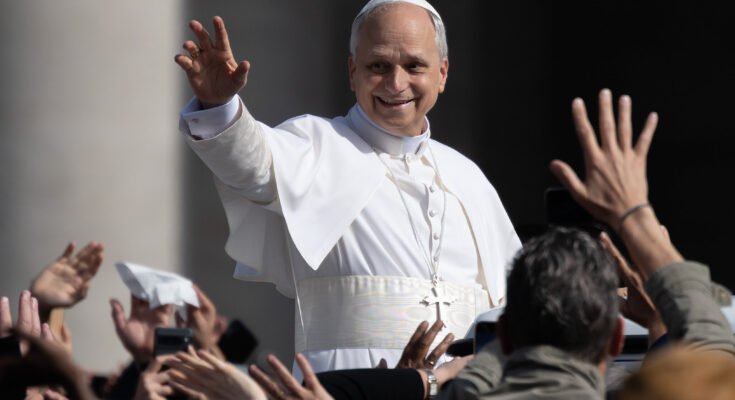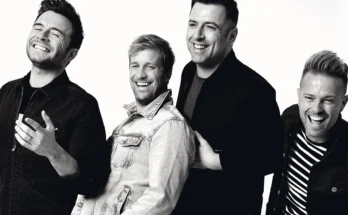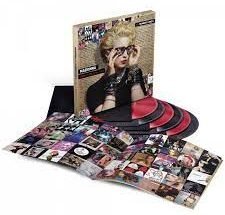VATICAN CITY — In a moment charged with history and spiritual significance, the newly elected Pope Leo XIV delivered his first Mass as pontiff on Friday morning, calling on the Roman Catholic Church to be “a beacon that illuminates the dark nights of this world.” In the solemn atmosphere of the Sistine Chapel, beneath Michelangelo’s legendary frescoes, the 69-year-old pontiff offered a rousing and deeply symbolic homily to a gathering of cardinals, broadcast live to millions of faithful around the globe.
Just a day after his surprise election as the 267th Pope—and the first American to ever lead the world’s 1.4 billion Catholics—Leo XIV used his first official address to urge a return to faith in a world “desperately drifting toward hollow idols.”
“People no longer look to faith but to technology, money, success, power, or pleasure,” he said, warning of an era in which Christian values were seen as “absurd” and increasingly irrelevant in global culture.
“The Church Must Be Light in Darkness”
Pope Leo XIV, born Robert Francis Prevost in Chicago, spoke in Italian during his homily but briefly addressed the cardinals in English during his introduction. Clad in traditional white papal robes trimmed with gold, his voice carried firm conviction as he laid out his vision for the Catholic Church: one rooted in mercy, outreach, and moral clarity amid global uncertainty.
“A lack of faith is often tragically accompanied by the loss of meaning in life,” he warned. “The neglect of mercy, appalling violations of human dignity, the crisis of the family—these are not abstractions but wounds that afflict our society.”
His words struck a chord not only among those seated within the chapel’s historic walls but also across continents—especially in the United States and Peru, where Prevost’s spiritual journey has left deep roots.
From Peru to the Papacy: A Missionary’s Journey
Before his ascension to the papacy, Prevost had spent over two decades ministering to the poor in Chiclayo, Peru, as an Augustinian missionary. His quiet, humble style of leadership and deep commitment to social justice resonated particularly with followers of the late Pope Francis, who himself had steered the Church toward inclusivity, climate action, and compassion for the marginalized.
Prevost, a relatively unknown figure on the global stage just months ago, was rapidly elevated in Church hierarchy. Appointed cardinal in 2023, speculation swirled in Vatican corridors that Francis had been preparing him for greater responsibilities—an intuition that proved prescient.
“I Know I Can Rely On You”
In an unscripted moment before his sermon, Pope Leo turned to the cardinals around him and spoke in his native English:
“I know I can rely on each and every one of you to walk with me.”
The simple but direct appeal struck a chord with many inside the Church seeking stability, unity, and moral clarity in what has become a polarized global landscape.
Observers quickly noted Leo’s emphasis on missionary outreach, echoing themes Francis often championed. His focus on bridge-building, dialogue, and peace sent a clear message: his papacy will not retreat into doctrine but rather expand the Church’s engagement with a fractured world.
Thunderous Joy at Home and Abroad
News of his election sent cheers through St Peter’s Square on Thursday evening, where tens of thousands watched white smoke emerge from the chimney above the Sistine Chapel, signaling a successful papal vote.
Shortly afterward, Prevost emerged onto the central balcony of St Peter’s Basilica, smiling and waving to the crowd as he was introduced as Pope Leo XIV. His choice of name—Leo—is widely seen as symbolic, evoking Pope Leo XIII, a renowned intellectual and social reformer, as well as St Leo the Great, who defended Christian doctrine during turbulent times.
Back in the United States, the reaction was euphoric. In Chicago, spontaneous gatherings erupted in churches and public spaces. In Peru, the faithful in Chiclayo—where he served for two decades—held processions and Masses in his honor.
A New Era, a Familiar Mission
Leo XIV inherits a Church facing enormous challenges: declining attendance in the West, internal divisions over doctrine, abuse scandals, and rising political polarization that threatens to fragment global Catholicism. His election comes amid renewed wars in Europe and the Middle East, growing refugee crises, and an intensifying climate emergency.
Still, his background as a missionary, his stance on social justice, and his American roots have positioned him as a unique bridge-builder in a time of widespread disconnection.
In his previous roles, Prevost was not afraid to voice strong opinions. As cardinal, he had criticized elements of U.S. immigration policy and challenged prominent Catholic voices in American politics. Notably, he rebuked U.S. Vice President JD Vance earlier this year over a statement ranking loyalties in Christian love.
“Jesus doesn’t ask us to rank our love for others,” Prevost had tweeted in February. “He asks us to love without measure.”
What Comes Next?
All eyes now turn to Pope Leo’s next public appearances: Sunday’s Regina Coeli prayer and a Monday news conference with journalists from around the world. Vatican observers and faithful alike will be watching closely for signs of his intended direction, tone, and governing style.
Many expect Leo XIV to continue the progressive but pragmatic path laid by Pope Francis, emphasizing mercy, environmental stewardship, and a Church that walks with people rather than dictating from above.
Yet his North American background may also bring a sharper sense of the political and cultural tensions the Church must navigate in the West.
Final Reflections
Pope Leo XIV’s first Mass has set the tone for what many hope will be a transformative era in the Church’s long history. His call for unity, humility, and moral clarity was clear—and deeply needed.
As one Vatican insider put it: “This was not just a homily—it was a blueprint.”
Whether his papacy will fulfill the promise of renewal remains to be seen. But in the echoing walls of the Sistine Chapel, in the hearts of Catholics from Lima to Los Angeles, a message rang out: The Church must be light again in a darkening world.
And with Pope Leo XIV now at the helm, the flame has been rekindled.



